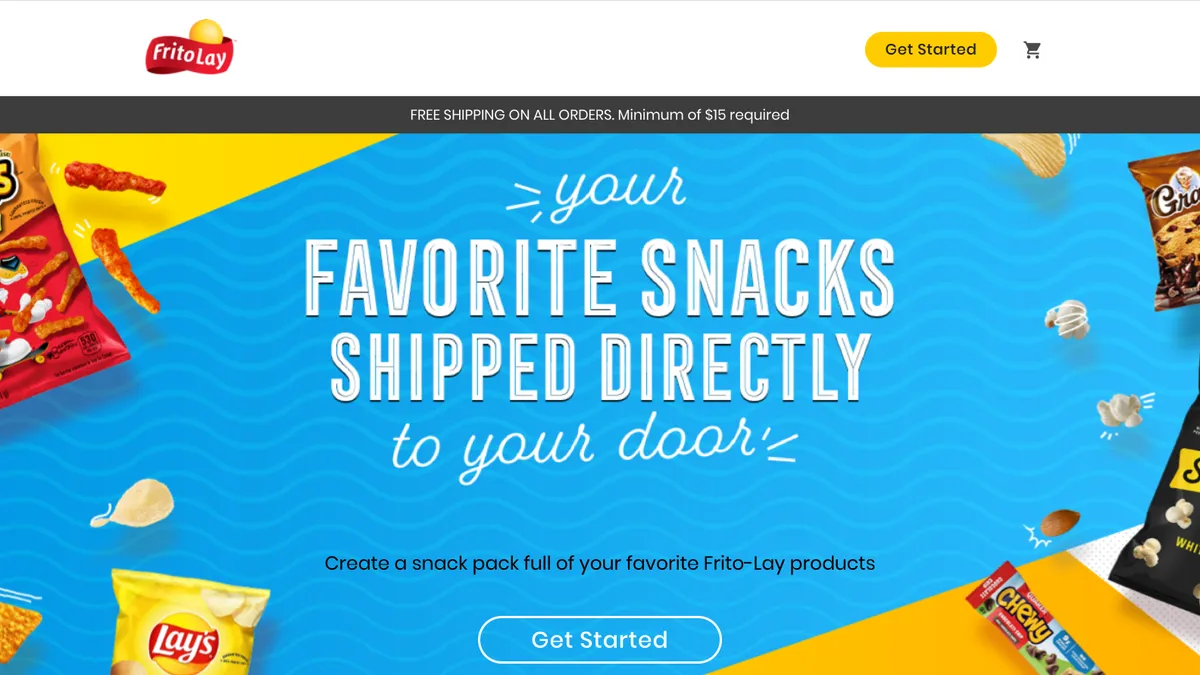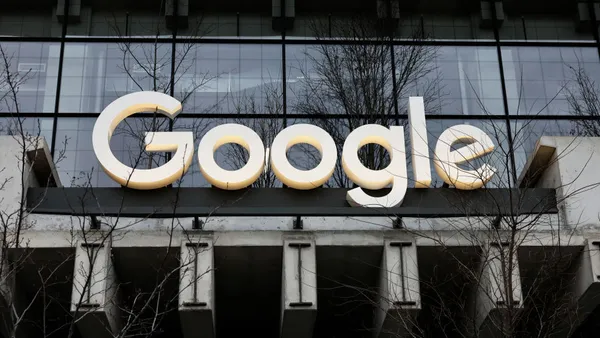Dive Brief:
- PepsiCo has launched two direct-to-consumer websites where shoppers can order an assortment of the company's products, the snack and beverage giant said in a statement.
- PantryShop.com allows consumers to order specialized bundles containing PepsiCo's top-selling pantry favorites from brands including Quaker, Gatorade, SunChips and Tropicana within categories such as "Rise & Shine," "Snacking," and "Workout & Recovery." The other site, Snacks.com, enables shoppers to choose from more than 100 of their favorite Frito-Lay products like Lay's, Tostitos, Cheetos and Ruffles, as well as dips, crackers and nuts.
- Gibu Thomas, senior vice president and head of e-commerce at PepsiCo, told Food Dive the two sites went from idea to launch in 30 days. To expedite the process, the company made some trade-offs, including limiting which of its products would be listed. Over time, Thomas said the company will add new offerings to its direct-to-consumer platform, which could include its Starbucks drinks or some of its iconic sodas. "Ultimately, our goal is we want to give the consumer as many choices as possible to shop for our products whenever, wherever, however they want to shop," he said in an interview.
Dive Insight:
While PepsiCo is no stranger to e-commerce, the rollout of these direct-to-consumer sites is reflective not only of a company working on giving shoppers more places to purchase their products, but one that is quickly responding to trends that have been amplified during the pandemic.
CPG companies across the country have seen consumers stock up on a host of different types of products, many of which are found in PepsiCo's portfolio, including chips and oatmeal. But with shoppers quarantined or reluctant to leave their homes, e-commerce has become an increasingly popular way for shoppers to buy their groceries. Direct-to-consumer shipments have not traditionally been a major source of revenue for large CPG companies.
Interestingly, PepsiCo has created two sites for its direct-to-consumer offerings that address specific needs rather than create a single site where everything can be housed together. PantryShop.com and Snacks.com shrewdly focus on consumers' needs rather than specific products or brands.
For example, Snacks.com is being used to help consumers to buy Frito Lay's sweeping portfolio offerings like Tostitos or Cheetos — some of which may include harder-to-find SKUs — rather than the Frito Lay website itself. At the same time, PantryShop.com focuses on specific consumer desires.
The "Rise & Shine" kit comes with Tropicana juice, Quaker oatmeal and Life cereal. "Workout & Recovery" contains Gatorade protein bars, Muscle Milk and enhanced electrolyte water Propel. With parents busy teaching their kids, exercising at home instead of the gym or eating breakfast in their kitchens rather than on the way to work, the bundles are designed to meet consumers where they are.
Thomas said the bundles at PantryShop.com could eventually influence how PepsiCo displays products in stores. If "Workout & Recovery" is a hit, the company could consider displaying these products together at retail as well.
"The test for direct-to-consumer always is, can you provide a value proposition that really resonates with the consumer, right? Because that's when you get the repeats. That's when you get the sustainable proposition," Thomas said.
It makes sense for items that could be consumed together to be available on the same website to promote direct-to-consumer sales. It would be too much work for a consumer to go to Tropicana.com for the beverage, then QuakerOats.com for oatmeal and so on for dozens of other items, whether the brands are owned by PepsiCo or another CPG company. Only consumers who especially love a particular brand or product would want to direct-to-consumer shop this way. In addition, having a collection of items together at one place like Snacks.com encourages impulse buys common on grocery store shelves.
It's unlikely PepsiCo will ever collect more sales from consumers through e-commerce then it does at the retail level. With more people purchasing goods online now, however, it is becoming a bigger part of sales, especially during the coronavirus pandemic. Analysts have speculated that the push to buy products online has accelerated in recent weeks as consumers have gotten used to the convenience and simplicity. Thomas echoed this sentiment, and noted this gave PepsiCo confidence to more forward with its direct-to-consumer initiative.
PepsiCo executives told analysts during its Q1 earnings call late last month that it is diverting some funds to reinvest in e-commerce as consumers spend more time shopping in this channel.
Even if some people go back to brick-and-mortar stores for a part or all of their shopping, e-commerce and direct-to-consumer shopping will undoubtedly remain a bigger part of consumers' buying habits. PepsiCo has clearly witnessed how much consumers have turned to e-commerce in recent weeks and worked quickly to respond.
















